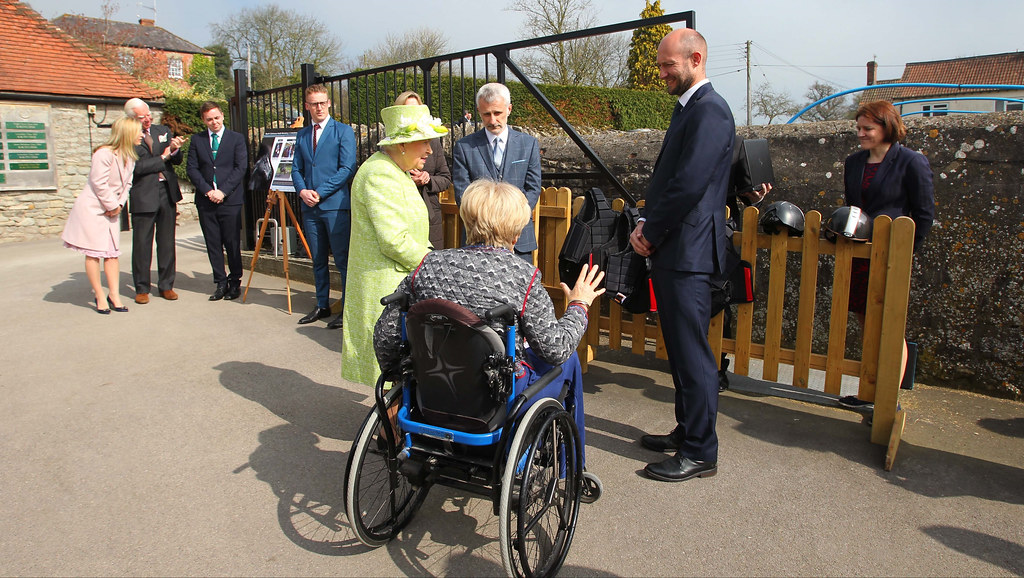Her Majesty The Queen met University of Bath researchers involved in innovative projects both aiming to reduce injuries in horse racing.
The meeting, part of a Royal Visit to Somerset, took place at leading horse trainer Paul Nicholls’ Manor Farm Stables near Shepton Mallet, where Her Majesty met researchers from the University’s Department for Health and Department of Electronic & Electrical Engineering.
Improving rider safety
Her Majesty heard from Professor Keith Stokes and Dr Dario Cazzola from the University’s Department for Health, who presented their new project with the British Horseracing Authority (BHA) which focuses on spinal injury reduction for jockeys.
This research builds on the success of previous injury prevention work led by the team for Rugby Union. It will use the BHA’s digital archive of race footage to map and digitally re-construct the detail of how jockeys fall.
Combined with research to be conducted at the British Racing School in Newmarket, the project will highlight the links between certain types of falls and increased chances of spinal injury.
Professor Keith Stokes explained: “Spinal injuries can have a dramatic impact on peoples’ lives and using the digital archive to inform strategies that have the potential reduce the risk of these injuries is extremely valuable.
“Today was an exciting opportunity to showcase to Her Majesty the important impact we hope to make with these projects in improving safety in horse racing.”
Also present at the Stables was Dr Jerry Hill, Chief Medical Adviser at the BHA. The BHA is co-ordinating three related projects looking at this issue, including ones at University College Dublin and the University of Sydney. It is hoped that the various projects will give a greater understanding of how falls impact concussion and spinal injury in order to propose new measures that might mitigate risk.
Dr Hill explained: “We have three related projects all running in parallel and using the BHA’s digital archive of races. Combined, this work has a great potential to make an important difference to horse racing safety and it was a real honour to present this work to Her Majesty in Somerset.”
Improving horse welfare
Her Majesty also learnt about the pioneering work of Dr Ben Metcalfe from the University’s Department of Electronic & Electrical Engineering. He is developing an innovative sensor platform for racing horses that would give trainers and veterinary professionals more accurate, reliable, real-time data on horse fitness and wellbeing.
The EquiVi platform, designed and developed by Dr Metcalfe and currently in prototype, is a non-invasive wearable device – similar to a fitness and activity tracker used by humans – that can provide real-time measurement of a horse’s vital signs, including cardiovascular health.
Dr Ben Metcalfe added: “I have grown up riding and caring for horses since I was a young boy and their welfare and wellbeing is something that really matters to me.
“Horses are complex living organisms and their health, wellbeing, and performance on the racetrack are all of significant interest to a wide range of stakeholders. The development of clinically validated sensors that can provide real-time data from ambulatory animals to their owners, trainers, and veterinarians represents a major step forwards and has the potential to drastically improve the wellbeing of the animals.”
HM Lord-Lieutenant of Somerset, Annie Maw added: “I was extremely impressed by the success of research at the University of Bath to reduce the incidence of high spinal injuries for rugby union.
“A while back I was fortunate enough to see this demonstrated to Prince Harry, when we all discussed the possibility of applying the same science to safety of riders in equine sport.
“As a paraplegic – the result of falling from a horse – I take a particular interest in these issues. I sincerely hope that this work could help reduce incidence of what is a truly devastating injury.
“I am delighted we have been able to showcase this important work to Her Majesty during the recent Royal Visit to Somerset.”
In 2017, HRH Prince Harry visited the University of Bath in his capacity as Patron of the Rugby Football Union’s Injured Players Foundation. During his visit he learnt about injury prevention techniques and protocols developed by the Bath team, including the new scrum engagement technique ‘crouch, bind, set’ which resulted in a global change in scrum engagements.

